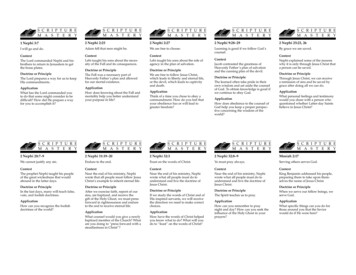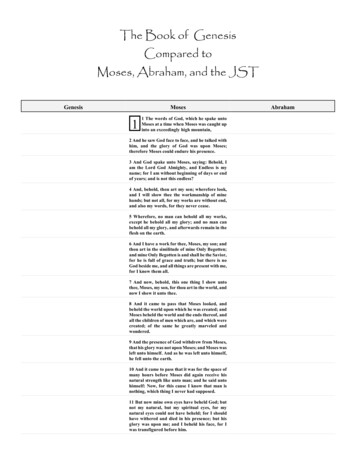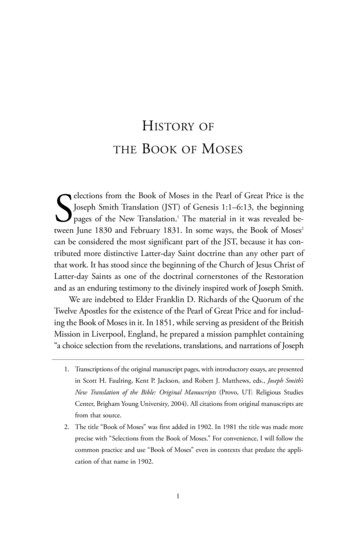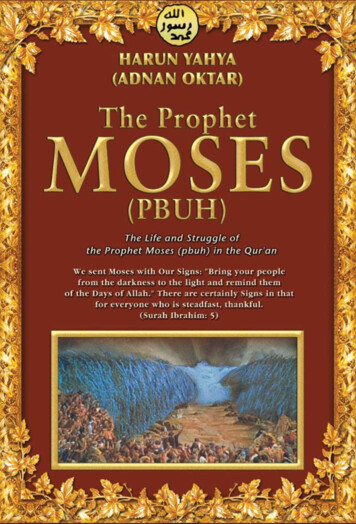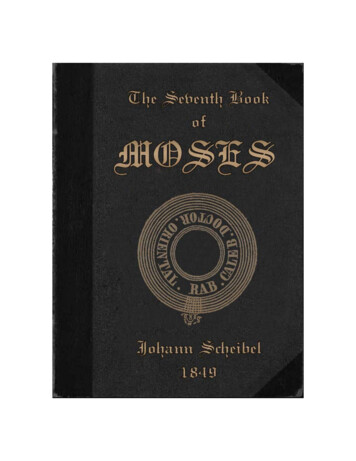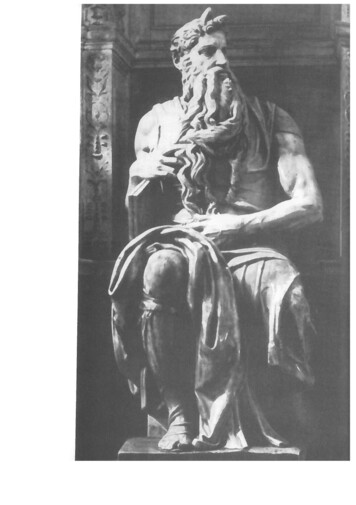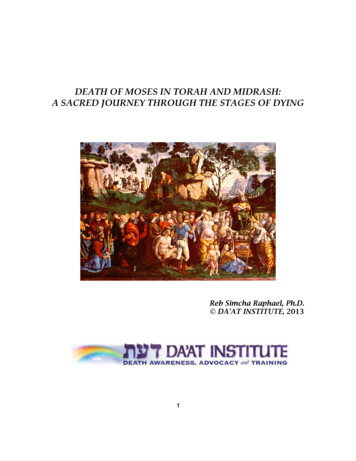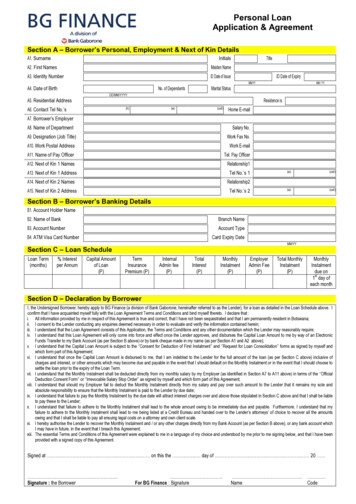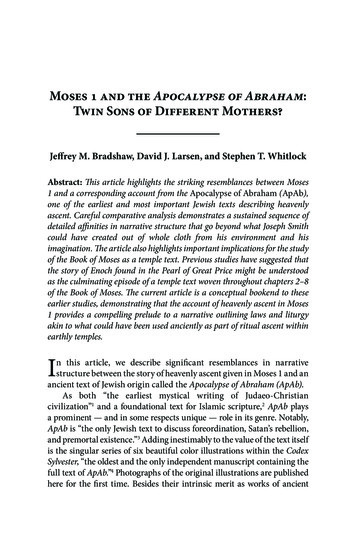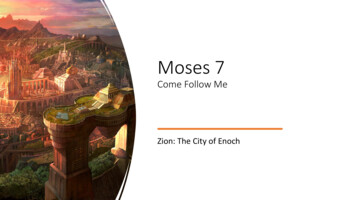
Transcription
Moses 7Come Follow MeZion: The City of Enoch
The Book of MosesJeffrey Bradshaw writes that it is highly original: For example, according to apreliminary linguistic analysis by Stanford Carmack, the language of the account isby and large “independent of Genesis language,”[1] with an initial authorshipdiagnostic strongly indicating that the text is not “pseudobiblical or biblical orJoseph Smith’s own pattern.”[2][1] Carmack, “Book of Moses English.” See: Jeffrey M. Bradshaw, Moses 6-7 and the Book of the Giants: Remarkable Witness of Enoch’s Ministry, Interpreter: A Journal ofLatter-Day Saint Faith and Scholarship, 48 (2021).[2] Carmack, “Book of Moses English.” Among other findings, Carmack also notes the following: “[The Book of Moses’ pattern] is similar to the Book of Mormon’s pattern,which is an uncommon, early modern pattern. However, at least one linguistic pattern found in the Book of Moses is quite unlike Book of Mormon usage: the absenceof relatively heavy periphrastic did usage.”.
The Book of Moses is RemarkableThe Givens’ write, “The most remarkable religious document published in thenineteenth century may well be an ascension narrative in which the prophetEnoch is taken into heaven and records his ensuing vision. He sees Satan’sdominion over the earth, and God’s unanticipated response to a world veiled indarkness: “The God of heaven looked upon the residue of the people, and Hewept; and Enoch bore record of it, saying: How is it that the heavens weep, andshed forth their tears as the rain upon the mountains? And Enoch said unto theLord: How is it that thou canst weep?”The question here is not about the reasons behind God’s tears. Enoch does not ask,why do you weep, but rather, how are your tears even possible, “seeing thou artholy, and from all eternity to all eternity?” Clearly, Enoch, who believed God to be“merciful and kind forever,” did not expect such a being could be moved to thepoint of distress by the sins of His children. And so a third time he asks, “how is itthou canst weep?"
It is audacious in its claims: The accountwas produced early in Joseph Smith’sministry—in fact, in the same year as thepublication of the Book of Mormon—aspart of a divine commission to“retranslate” the Bible. Like Doctrine andCovenants 76, it seems to contain manysignificant items that were removed“from the Bible, or lost before it wascompiled.
Only a few daysFinally, Bradshaw notes that the Book of Moses was producedat record speed: Judging by the rapidity by which similar passageswere translated, the account of Enoch found today in Moses 6–7would appear to have occupied only a few days of the Prophet’sattention.
The main message: The nature of GodMoses 7 portrays a God who cares for his children, a God who weeps.God is not exempt from emotional pain. Exempt? On the contrary,God’s pain is as infinite as His love. He weeps because He feelscompassion. As the Lord explains to Enoch, “unto thy brethren have Isaid, and also given commandment, that they should love one another,and that they should choose me, their Father; but behold, they arewithout affection, and they hate their own blood . . . and misery shallbe their doom; and the whole heavens shall weep over them, even allthe workmanship of mine hands; wherefore should not the heavensweep, seeing these shall suffer?” (Terryl and Fiona Givens, God Who Weeps, Ensign Peak, 2012, p. 24)
Enoch’s initial vision: Cain versus Shum:Moses 7.1-9a Become the Sons of God – Moses 7.1The “place Mahujah” and Mount Simeon – Moses 7.2Enoch beheld God’s glory and was clothed, sees vision – Moses 7.3-4.The people of Shum, tent dwellers – Moses 7.5.The north country, people of Canaan, also in tents – Moses 7.6.The battle: Shum v. Canaan, Shum’s people destroyed – Moses 7.7.The “curse” upon the children of Cain – Moses 7.8.
Enoch’s preaching to the inhabitants of the earth:Moses 7.9b-17. The seven lands of Enoch: Sharon, Enoch, Omner, Heni, Shem, Haner, and Hanannihah- Moses7.9. Enoch baptizes those who listen – Moses 7.11. Rivers turned out of their course, the roar of lions – Moses 7.13.[1] A land comes up out of the depths of the sea – Moses 7.14.[1] Of special note is a puzzling phrase in some translations of the Book of Giants that immediately follows the description of the battle: “ the roar of the wild beastshas come and they bellowed a feral roar.” Remarkably the book of Moses account has a similar phrase following the battle description, recording that “the roar of thelions was heard out of the wilderness.” See: F. G. Martinez, Book of Giants (4Q531), 2:8, p. 262. Cf. J. T. Milik et al., Enoch, p. 308: “the roaring of the wild beastscame and the multitude of the wild animals began to cry out”; L. T. Stuckenbruck, Book of Giants, 4Q531, 17:8, p. 164: “] rh of the beasts of the field is coming andthe hinds of the field are calling.” Contrast the translation of M. Wise et al., DSS, Book of Giants (4Q531), 22:8, p. 293: “the wild man they call [me].” Regardingtranslation difficulties in this passage, see L. T. Stuckenbruck, Book of Giants, p. 163.
Enoch’s preaching to theinhabitants of the earth: Moses7.9b-17 (cont.) Giants in the land, a curse upon all people –Moses 7.15.[1] Wars and bloodshed “among them,” butthe Lord “dwelt with his people” – Moses7.16.[1] This is the Giants narrative recontextualized. The Giants narrative is addressed in Genesis 6.1-4 and in 1 Enoch 6, 1 Enoch 7, and 1Enoch 8. The mythological essence of this Enoch material is essential in order to grasp what many New Testament authors weredoing when discussing the Messiah and his role against evil. The story of the Giants also is vital to understanding ancient Israeliteunderstanding of the origin of evil, something lost to modern readers. For much more on this topic, I would recommend readingthese chapters in 1 Enoch (see above) as well as Michael Heiser’s The Unseen Realm: Recovering the Supernatural Worldview of theBible, Lexham Press, 2015.
The Giants – Genesis 6.4 and Moses 8.18 – הַ נְּ ִפ ִלים הָ יּו בָ אָ ֶרץ בַ י ִָמים הָ הֵ ם Genesis 6.4“The Nephilim they were in theland in those days ”
Understanding theGiantsNephilim comes from naphil: –נ ִָפיל probably from naphal: נָפַ ל a wordthat can mean “to fall” or falldown. The word naphil relates to abully, or a tyrant.The LXX used the word γίγαντες todescribe this word.
Understanding the Giants1. The temple narrative and Revelation 12.2. The text of the Book of Enoch – especially chapters 6-11. (See: 1Enoch 6, 1 Enoch 7, 1 Enoch 8, 1 Enoch 9, 1 Enoch 10.)3. Understand the timing and nature of the textualization of Genesis6.1-4. These verses are coming from J, and are probably editedduring the exile, as they are a polemic against the ideas andreligious beliefs in Babylon.
The establishment of Zion: Moses 7.18-23a. The Lord called his people Zion: One heart, one mind, no poor – Moses 7.18. Today we should also takenote and also beware of “the idle rich.” The Saints in Enoch’s Zion loved each other as equals. See also4 Nephi 1.3. Joseph Smith, speaking to the Relief Society, said “All must act in concert, or nothing canbe done.” Enoch talked with the Lord – Moses 7.20. In an uncanonized revelation on Enoch found in RevelationBook 2, additional details are given about Enoch’s vision. For example, we learn that the visionincluded important events from premortal life. We are told that Enoch saw “the beginning, the endingof men; he saw the time when Adam his father was made, and he saw that he was in eternity before agrain of dust in the balance was weighed. He saw that he emanated and came down from God.” Enoch beheld Adam’s children – Moses 7.22. As in 3 Enoch 45, Joseph Smith’s Enoch in the Book ofMoses is shown all the generations of mankind from beginning to end.
Zion צִ ּיֹון Donald and Jay Parry give us the following regarding Zion: In thisremarkable revelation to Enoch, the Lord reveals much regarding thelatter-day Zion. He designates this city by four names: Zion, NewJerusalem, Holy City, and mine abode. The first name attests that thecity will be a place of safety: the Hebrew word Zion means“stronghold” or “citadel.” New Jerusalem, the second name, relatesZion to Jerusalem of ancient Palestine but is marked New todifferentiate it from Old Jerusalem; the third name, Holy City, showsZion to be consecrated and set apart from other places; and the fourth,mine abode, (Moses 7.68) indicates that Zion will be the Lord’s home,where he will reign for a thousand years. See: D. W. Parry et al., Understanding the Signs, p. 184.
Zion צִ ּיֹון Zion צִ יֹון is related to the word צִ יּון a word that means “signpost” or“marker” – see: Jeremiah 31.21and Ezekiel 39.15. Zion is themarker or signpost Yahweh usesto reclaim Israel.
Enoch’s next vision: The Son of Man, Satan,the tears of God: Moses 7.23b-41.* Enoch is now lifted up to heaven “in the bosom of theFather” – Moses 7.24.* The power of Satan was upon the earth (v. 24) and angelsdescend out of heaven in connection with “wo’s” out ofheaven. To me, these angels are the Watchers, or darkangels coming to torment mankind.* Enoch sees Satan with a great chain in his hand – Moses7.26
Enoch sees God weep* Enoch sees God weep – Moses 7.28.* Enoch asks, “How can you weep?” – Moses 7.2931.* God weeps because humans hate each other –Moses 7.33.* Man of Counsel, Man of Holiness, Endless andEternal is my name – Moses 7.35.* Should not the heavens weep, seeing these shallsuffer? – Moses 7.37. We see a similar passage in 3Enoch.
A world most wicked – Moses 7.36In regard to the battle in heaven.let me tell you that it was one-thirdpart of the spirits who were prepared to take tabernacles upon thisearth, and who rebelled against the other two thirds of the heavenlyhost; and they were cast down to this world. It is written that theywere cast down to the earth. They were cast down to this globe—tothis terra firma that you and I walk upon, and whose atmosphere webreathe. One-third part of the spirits that were prepared for this earthrebelled against Jesus Christ, and were cast down to the earth, andthey have been opposed to him from that day to this, with Lucifer attheir head (Brigham Young, Discourses, 54-55).
A world most wicked – Moses 7.36I wish we could promise you that the world will be safer and easier for you than forus. But we cannot make that promise, for just the opposite is true. There aretemptations beckoning to you that were not there when we were teenagers. AIDShad not been invented when we were young, and drugs were something a doctorprescribed. We knew about opium from reading mysteries, but steroids, pills, andcrack and all the rest belonged to future imaginations. Modesty was not mockedthen. Morality and courtesy were fostered in books and films as much as theiropposites are today. Perversion was not talked about, much less endorsed as a lifestyle. What was shunned then as pornographic, you see now on prime-timetelevision. Your challenge is much greater than was ours. Few of us would tradeplaces with you. Frankly, we are quite relieved that we are not back where youare. Few of us would be equal to it. But, oh, what a wonderful time to be young!You have knowledge of many more things than we needed to have. It is myconviction that your generation is better and stronger than was ours—better inmany ways! I have faith that you young men and young women can meet the worldon its own terms and conquer it! (Boyd K. Packer, Ensign, May 1989, 54).
A world most wicked – Moses 7.36The Lord has chosen a small number of choice spirits of sonsand daughters out of all the creations of God, who are toinherit this earth; and this company of choice spirits havebeen kept in the spirit world for six thousand years to comeforth in the last days to stand in the flesh in this lastdispensation of the fulness of times, to organize the kingdomof God upon the earth, to build it up and to defend it and toreceive the eternal and everlasting priesthood of God(Wilford Woodruff, Title of Liberty, 197; Quoted in Teachings of Ezra Taft Benson, 555).
Enoch sees Noah, the Lamb slain, hears the earthmourn, sees The Son of Man ascend to the Father:Moses 7.42-59.* Enoch weeps for the sons of Adam – Moses 7.44.* Enoch says, “I refuse to be comforted” – Moses 7.44.* The Lamb is slain – Moses 7.47.* The earth speaks: “Wo, wo is me, the mother of men, I am pained, I amweary ” – Moses 7.48.* Enoch cries, “Have mercy on Noah and his seed!” – Moses 7.50.* An unalterable decree is given – Moses 7.51-52.* When shall the earth rest? – Moses 7.54.* The Son of Man is lifted up, the creations mourn, spirits in prison comeforth, and Enoch weeps – Moses 7.55-58
Enoch sees the last days and the reunification of Saints, andtribulations among the wicked: Moses 7.60-66.* Darkness covers the earth, but “my people will Ipreserve” – Moses 7.61.* Righteousness from heaven, truth out of the earth: theRestoration of the Kingdom of God and the Book ofMormon – Moses 7.62.* The elect gathered, Zion built – Moses 7.62.* The City of Enoch will meet the later day Zion, they will“fall upon their necks” and “kiss each other” – Moses 7.63.
[2] Carmack, "Book of Moses English." Among other findings, Carmack also notes the following: "[The Book of Moses' pattern] is similar to the Book of Mormon's pattern, which is an uncommon, early modern pattern. However, at least one linguistic pattern found in the Book of Moses is quite unlike Book of Mormon usage: the absence
